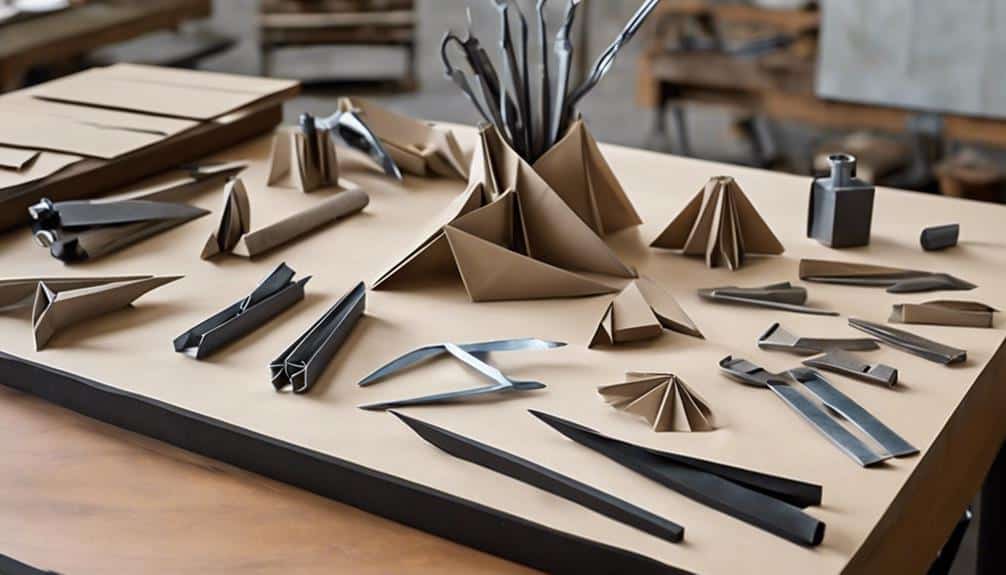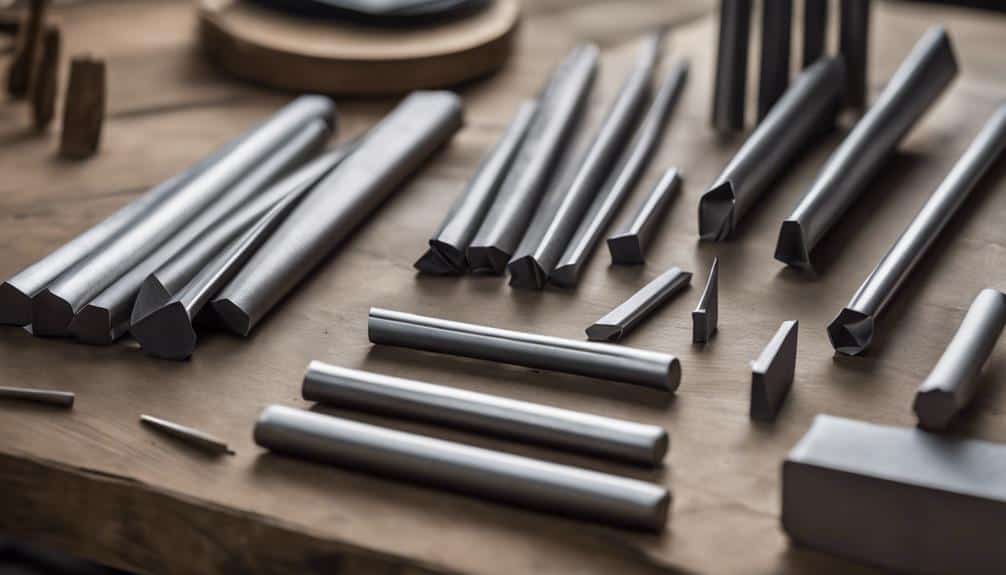Carbon steel round bars are highly valued for exceptional strength, weldability, and wear resistance, offering cost-effective solutions for engineering projects. Their machining capabilities allow for precise fabrication, while corrosion resistance guarantees longevity in harsh conditions. Heat treatment further enhances mechanical properties, making them reliable and cost-efficient for diverse applications. Different grades and types cater to specific needs, with varying machining properties and corrosion resistance. Understanding carbon steel grades is crucial for the best material selection, as properties are influenced by carbon content and heat treatment. Explore further into the benefits and considerations for using carbon steel round bars in engineering and manufacturing tasks.
Key Takeaways
- Different grades offer unique properties based on carbon content
- Consider machining properties for precise fabrication
- Corrosion resistance is crucial for longevity in various environments
- Material selection and heat treatment influence mechanical performance
- Surface finishing impacts aesthetics and durability
Why choose carbon steel rounds?

Carbon steel rounds offer exceptional strength, durability, and cost-effectiveness, making them a preferred choice in engineering and manufacturing applications.
With a wide range of grades and shapes available, carbon steel rounds cater to specific requirements, from good weldability to increased strength and wear resistance.
Their versatility, reliability, and enhanced machinability make carbon steel rounds a practical and efficient solution for various industries and projects.
Advantages of carbon steel round steel
Renowned for their exceptional strength, durability, and cost-effectiveness, carbon steel round bars are favored in various industries for their versatility and reliability. These round bars offer significant machining advantages, allowing for easy fabrication processes. Their strength benefits make them a reliable choice for applications demanding toughness and durability.
Additionally, the cost-effectiveness of carbon steel rounds makes them a preferred option for projects where budget considerations are key. The durability features of carbon steel round bars guarantee long-term performance and resilience in demanding environments. Their application versatility spans across industries like aerospace, automotive, and oil and gas, making them a versatile and reliable material choice for a wide range of engineering and manufacturing applications.
Why carbon steel rounds are suitable for a variety of engineering and manufacturing applications
With their exceptional strength, versatility, and reliability, carbon steel round bars stand out as a preferred material choice for a diverse array of engineering and manufacturing applications. The machining capabilities of carbon steel rounds allow for precise fabrication processes, making them ideal for projects requiring intricate designs.
Their impressive strength properties, including hardness and wear resistance, guarantee durability in demanding environments. Additionally, carbon steel rounds offer cost efficiency compared to other materials, making them a practical choice for various projects.
Their versatile applications span across industries such as aerospace, automotive, and construction, thanks to their corrosion resistance, which enhances longevity and performance in challenging conditions.
The use of carbon steel round bar

Utilizing precision-crafted carbon steel round bars offers industries a reliable and cost-effective solution for enhancing project efficiency and longevity. When considering the use of carbon steel round bars, the following aspects play an important role:
Machining Techniques: Carbon steel round bars are known for their excellent machinability, allowing for intricate fabrication processes with precision and ease.
Corrosion Resistance: These round bars exhibit good corrosion resistance, making them suitable for applications where exposure to harsh environments is a concern.
Heat Treatment: Carbon steel round bars can undergo heat treatment processes to enhance their mechanical properties, such as hardness and toughness, to meet specific application requirements.
Material Properties: The material properties of carbon steel round bars, including strength, durability, and wear resistance, make them a preferred choice for various industry applications.
Understanding Carbon Steel Grades

Understanding carbon steel grades is essential for selecting the right material for specific applications. Carbon steel grades vary in their properties, with different levels of carbon content influencing factors like strength, hardness, and machinability.
Carbon Steel Grade List
Exploring the Classification of Carbon Steel Grades for In-depth Understanding.
Material Selection: Each carbon steel grade is tailored to meet specific material requirements based on the application’s demands.
Heat Treatment: Understanding the heat treatment capabilities of different carbon steel grades is essential in achieving the desired mechanical properties.
Welding Techniques: The welding characteristics of carbon steel grades vary, influencing the choice of welding techniques for best results.
Surface Finishes: Different carbon steel grades offer varying surface finishes, affecting the material’s aesthetics and corrosion resistance.
Types of Carbon Steel Round Bar

Distinguishing between the different types of carbon steel round bars is essential for selecting the most suitable option for specific applications and requirements. Carbon steel round bars come in various grades and types, each offering unique characteristics to meet distinct needs. When considering these types, factors such as machining properties, corrosion resistance, material selection, heat treatment, and surface finishing play vital roles in determining the most appropriate choice.
High-carbon round bars like 1035 and 1045 are favored for applications requiring increased strength and wear resistance. For enhanced machinability, specialized grades such as 1144, 11L14, and 12L14 are preferred. Low-carbon grades like 1018 are known for good weldability, while grades like 1020 and 1030 excel in surface hardening and machining processes. Additionally, alloy steel round bars offer a wide range of options for specific industrial requirements. Understanding these distinctions aids in making informed decisions when selecting carbon steel round bars for diverse projects.
Frequently Asked Questions
Can Carbon Steel Round Bars Be Easily Recycled or Reused in Other Applications?
Carbon steel round bars offer significant recycling benefits due to their ability to be melted and reused in various applications. The reuse potential of these bars contributes to a circular economy, promoting sustainable practices and reducing environmental impact.
Recycling carbon steel round bars aligns with sustainable practices, conserves resources, and minimizes waste, making them an environmentally friendly choice for industries seeking to enhance their green initiatives.
How Does the Carbon Content in Steel Affect Its Machinability and Formability?
The carbon content in steel greatly influences its machinability and formability. Higher carbon levels lead to increased hardness and strength but can reduce machinability, necessitating specific heat treatment and cold working techniques.
Conversely, lower carbon content enhances formability and weldability, often requiring annealing processes. The addition of alloying elements further refines these properties, impacting metal forming processes and final product characteristics.
Are There Any Specific Considerations When Welding Carbon Steel Round Bars?
When welding carbon steel round bars, several key considerations must be accounted for. These include:
- Selecting appropriate welding techniques and filler materials.
- Understanding material properties and metallurgical considerations.
- Proper joint preparation, preheating, and post-weld treatments.
Addressing challenges like distortion control is essential for achieving high-quality welds. Heat treatment may also be necessary to optimize the weld’s mechanical properties. These factors collectively contribute to a successful welding process.
What Are the Common Methods Used to Surface Harden Carbon Steel Round Bars for Increased Wear Resistance?
Surface hardening of carbon steel round bars for increased wear resistance commonly involves methods such as:
- Induction hardening, which uses electromagnetic induction.
- Flame hardening, employing localized heating.
- Carburizing process, introducing carbon into the surface layer.
- Nitriding treatment, which forms a hard nitride layer.
- Quenching and tempering, involving rapid cooling and reheating processes.
How Do Different Finishes on Carbon Steel Round Bars Impact Their Performance in Various Applications?
Surface finishes on carbon steel round bars play an essential role in determining their performance across various applications. Different finishes impact factors such as corrosion resistance, toughness, abrasion resistance, aesthetic appeal, and dimensional accuracy.
Heat treatment processes, coating options, polishing techniques, and grinding processes contribute to achieving desired surface finishes that optimize the bars’ functionality and durability in specific industrial settings.
Conclusion
To summarize, carbon steel round bars offer a cost-effective and efficient solution for industries requiring precision-crafted components with enhanced strength and wear resistance.
Like a well-oiled machine, these round bars excel in diverse applications, providing durability and performance in various projects.


